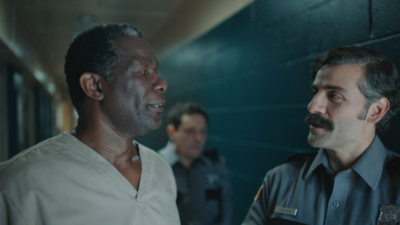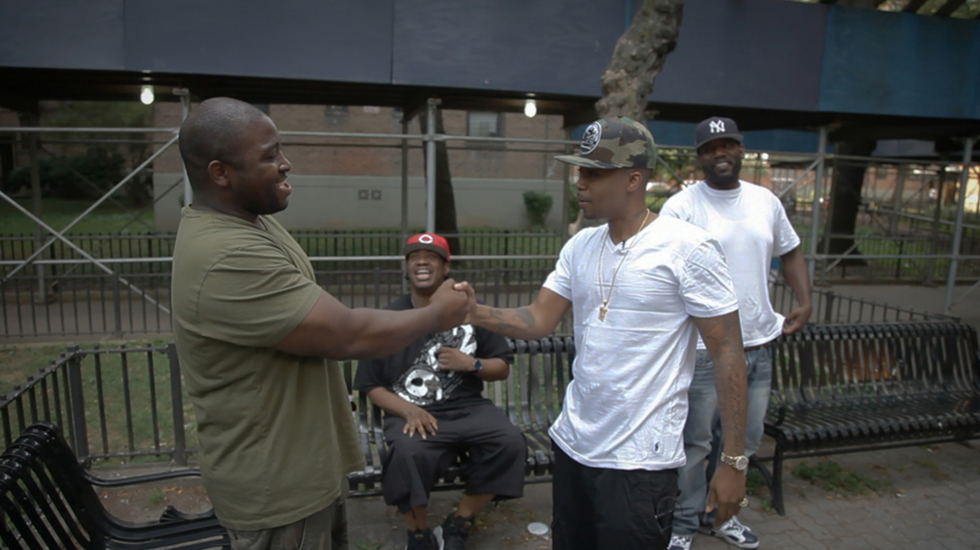
BY KAREN KEMMERLE |
One9 and Erik Parker Talk About The Legacy of ‘Nas: Time Is Illmatic’
In this four-part series, filmmakers One9 and Erik Parker provide a behind-the-scenes look at the making of ‘Nas: Time Is Illmatic’ and share their plan for bringing their film to schools and communities around the U.S.

In the final installment of our four-part series on the making of Nas: Time is Illmatic, One9 and Erik Parker talk about the universal issues they explore in their documentary and about their plans to initiate a unique educational opportunity. The two filmmakers share a moving scene involving Rap icon Q-Tip that didn’t make it into the final cut.
Tribeca: How did you work with TFI to develop an educational program based on your film?
One9: Our associate producer Martha Diaz is spearheading our education and community engagement component, and we couldn’t be more pleased with or proud of her work. She’s been collaborating with TFI's Education Department to develop a high school curriculum. TFI has successfully worked with other filmmakers to develop and implement curricula in NYC public schools, reaching over 20,000 students. It’s incredible.
If we just enjoy Nas’ voice but ignore his words, we'll have missed an opportunity to build a bridge to unite people from all levels of society.
Tribeca: What is the goal of the education initiative involving your film?
One9: Our goal is to reach high school and college students, as well as bridging cultural gaps. In addition to the high school curricula, we are co-teaching a college course that takes an in-depth look at the entire process of making Nas: Time is Illmatic.
Tribeca: How are you reaching out to people in different parts of the country with your film? Are the issues in Queensbridge universal?
Erik Parker: One9 and I are not from Queensbridge. Most of the people who bought Ilmatic back in 1994 were not from QB. The people who tell us they shed tears over the film's story are not from QB. However, we all understand the story. When Nas writes a letter to his friend who is incarcerated in "One Love," many young black kids in America could relate to his situation (and still unfortunately do). When he raps "cops could just arrest me, blaming us, we're held like hostages" on “N.Y. State of Mind,” he is only describing what we see going on today. Not much has changed for the better.
At one point—though it didn't make the film—Q-Tip showed us a picture from his phone. It was him as a young boy, surrounded by his friends. He pointed to each one and, sadly, told us a tragic story about each one. Many people in the picture were either dead or in jail. He carries the picture of his homies as a reminder of his background. His story sounded more like he was a soldier talking about fallen comrades in a far flung corner of the world than a boy growing up in America in the 80s and 90s. All one has to do is look at today's headlines to see how the conditions Nas faced are relevant all over America.
One9: We are working with community leaders/educators/artists and community building organizations to carve out a space to address and unpack some of the social issues that are reflected in the film. We know that housing, education, unemployment, and violence are still issues that so many disadvantaged young people face today. We don't just want to point out the issues; we also want to talk about the solutions. We want to offer ways to empower young people to respond to these problems.
We don't just want to point out the issues; we also want to talk about the solutions. We want to offer ways to empower young people to respond to these problems.
Tribeca: What do you hope students take away from your film?
One9: Our goal is to connect with students through music and to provide a pathway to success. Music provides an incredible outlet for self-expression and a career path. Along with the other arts, music also adds meaning to your life. Growing up in the arts gave me direction and enriched my life in so many ways.
Tribeca: What do you want the legacy of your film to be?
One9: We want this film to inspire young people to work for a purpose that is greater than them. We want to show that they can break through limitations and do it a way that represents who they are and where they came from.
Erik Parker: We hope this film opens the door to genuine understanding. While America would be more than happy to accept Nas as one of her sons today—Harvard recently named a fellowship in his honor—we want this film to show that there are kids out there who are not Nas but who deserve the same love and understanding. They're not all rappers. They are not all athletes. Nas tells us in the film, “If it wasn't for music, I probably wouldn't even be here." We cannot celebrate Illmatic without acknowledging the people Nas spoke for on that album.
If we just enjoy Nas’ voice but ignore his words, we'll have missed an opportunity to build a bridge to unite people from all levels of society. We want to uplift those who see Illmatic as an honest depiction of their world. Until we do something different, the times will continue to be Illmatic.

